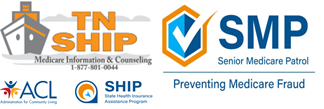Together, we can make a difference
Empowering Seniors to Prevent Medicare & Medicaid Fraud, offers assistance in educating beneficiaries on identifying and preventing Medicare and Medicaid fraud, waste and abuse. Upper Cumberland Development District (UCDD) received the grant to administer the SMP program in 2001. The grant is funded in part by Administration on Community Living. Prior to January 2006, the program name was Senior Medicare Patrol Project.
Fraud and Abuse
 The types of schemes that can and are being perpetrated against the health care system are as complex as the system itself. Common fraud schemes include efforts to fraudulently obtain and use a person’s Medicare number, as well as scams that specifically target Medicare services and plans.
The types of schemes that can and are being perpetrated against the health care system are as complex as the system itself. Common fraud schemes include efforts to fraudulently obtain and use a person’s Medicare number, as well as scams that specifically target Medicare services and plans.
If you are not receiving Social Security benefits, you will need to contact your local Social Security office and sign up for Part A. Three months before you turn 65, you need to contact your local Social Security office. You can also buy Part A during the following times, if you are not eligible for premium-free Part A: Initial Enrollment Period (three months before and three months after you turn 65), Special Enrollment Period (if you or your spouse is working and has insurance through your employer), and Special Enrollment Period for International Volunteers (if you are serving as a volunteer in a foreign country).
CMS contracts with outside companies to review medical claims, pay bills, and examine medical claims for patterns of inappropriate billing. These contractors use many techniques to identify potential payment issues and verify that the same mistakes are not repeated. Providers can be required to have every one of their claims examined before payment is made to ensure that abuse practices do not continue. On-site audits can be conducted and examiners can speak to beneficiaries and examine medical records to make sure that services billed to Medicare were the same services actually received.
Medicare fraud is defined as knowingly and willfully executing, or attempting to execute, a scheme or ploy to defraud the Medicare program, or obtaining information by means of false pretenses, deception, or misrepresentation in order to receive inappropriate payment from the Medicare program.
The most frequent kind of fraud arises from a false statement or misrepresentation that is relevant to entitlement or payment under the Medicare program.
CMS (Centers for Medicare & Medicaid Services) documents formally define fraud as “the intentional deception or misrepresentation that the individual knows to be false or does not believe to be true, and the individual makes knowing that the deception could result in some unauthorized benefit to himself or herself or some other person.”
Fraud can be committed by any of the following people or groups:
- Physicians or other health care practitioners
- Suppliers of durable medical equipment
- An employee of a physician or supplier
- An employee of the companies that manage Medicare billing
- A billing service
- A beneficiary
- Any other person or business in a position to bill the Medicare program or to benefit from Medicare being billed
Examples of Medicare Fraud
- Billing for services or supplies that were not provided
- Altering claim forms to obtain a higher payment amount
- Billing twice for the same service or item
- Billing separately for services that should be included in a single service fee
- Misrepresenting the diagnosis to justify payment
- Continuing to bill for services or items no longer medically necessary
- Billing for rental equipment after date of return
- Billing “non-covered” services or items as “covered” services
- Ordering unnecessary lab tests
- Refusing to bill Medicare for covered services or items
- Using another person’s Medicare card to obtain medical care
- Soliciting, offering, or receiving a kickback, bribe, or rebate (for example, paying for referrals of patients)
- Completing a Certificate of Medical Necessity (CMN) for a patient not professionally known by the provider
- Completing a CMN when not authorized (for example, a supplier completing a CMN for the physician)
- Signing authorizations for medical equipment or procedures that are not medically necessary
- Waiving co-insurance or deductible
- Billing for home health care services for patients who do not meet the requirement of “homebound” status
- Using unethical or unfair marketing strategies, such as offering beneficiaries free groceries or transportation to switch providers
- Billing social activities as psychotherapy
- Billing group services as individual services for each patient in the group
- Repeatedly violating the participation agreement, assignment agreement, or limiting charge
- Outpatient hospital services provided within 72 hours of surgery or other inpatient procedure (known as “the 72-hour rule”)
Definition of Medicare Abuse
Medicare Abuse is defined as incidents or practices of providers that are inconsistent with accepted sound  medical, business, or fiscal practices. These practices may directly or indirectly result in unnecessary costs to the program, improper payment, or payment for services that fail to meet professionally recognized standards of care, or that are medically unnecessary. The CMS definition of abuse is: “Billing Medicare for services that are not covered or are not correctly coded.” Abuse involves payment for items or services when there is no legal entitlement to that payment and the provider has not knowingly and intentionally misrepresented the facts to obtain payment.
medical, business, or fiscal practices. These practices may directly or indirectly result in unnecessary costs to the program, improper payment, or payment for services that fail to meet professionally recognized standards of care, or that are medically unnecessary. The CMS definition of abuse is: “Billing Medicare for services that are not covered or are not correctly coded.” Abuse involves payment for items or services when there is no legal entitlement to that payment and the provider has not knowingly and intentionally misrepresented the facts to obtain payment.
Examples of Medicare Abuse
- Excessive charges for services or supplies
- Routinely submitting duplicate claims
- Improper billing practices such as:
- Exceeding the limiting charge
- Billing Medicare at a higher fee schedule rate than for non-Medicare patients
- Submitting bills to Medicare when Medicare is not the beneficiary’s primary insurer
- Collecting more than 20% coinsurance or the deductible on claims filed with Medicare
- Breach of the Medicare participation or assignment agreements
- Claims for services that are not medically necessary
